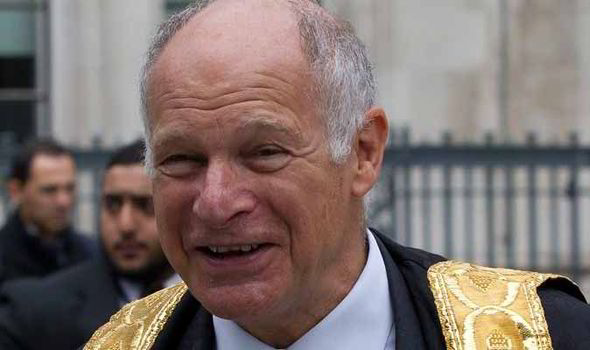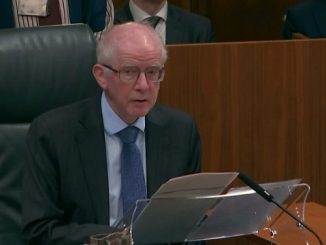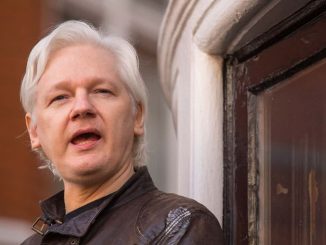
Lord Neuberger, the president of the UK’s Supreme Court has criticised politicians for not doing enough to defend judges following a row over the Brexit legal challenge.
Lord Neuberger said politicians did not speak out quickly or clearly enough and some media attacks had been unfair.
He said unjustified attacks on the judiciary undermined the rule of law.
After the government lost the Article 50 case at the High Court, a Daily Mail headline called the three judges in the case “enemies of the people”.
Lord Neuberger, who retires in September, was speaking to BBC Radio 4’s Today programme a month after the Supreme Court ruled that only Parliament, not ministers, had the power to trigger the UK’s exit from the EU because that was where laws were made.
The Daily Mail’s front page story was published when the government lost the first stage of the legal battle at the High Court last November.
That story sparked a furious row with critics, including MPs from all parties, accusing Liz Truss, the lord chancellor and justice secretary, of not standing up for an independent judiciary.
The Supreme Court, the final court of appeal in the UK for civil cases – and for criminal cases from England, Wales and Northern Ireland – hears cases of the greatest public or constitutional importance affecting the whole population.
Its justices also sit as the Judicial Committee of the Privy Council and as such will occasionally hear appeals against the death penalty from Commonwealth countries.
In an average year, the Supreme Court hears about 90 appeals and makes about 80 judgements on important issues of law.
In his interview, Lord Neuberger did not single out any newspaper or politician, but said: “We [judges in general] were certainly not well treated. One has to be careful about being critical of the press particularly as a lawyer or judge because our view of life is very different from that of the media.
“I think some of what was said was undermining the rule of law.”
Asked whether politicians had responded quickly enough to defend the judiciary and rule of law, Lord Neuberger said: “They were certainly vocal enough quickly enough after our hearing [in the Supreme Court].
“After the [High] Court hearing. I think they could have been quicker and clearer. But we all learn by experience, whether politicians or judges. It’s easy to be critical after the event. They were faced with an unexpected situation from which like all sensible people they learned.”
Lord Neuberger said that undermining the judiciary also undermined the rule of law as judges were “the ultimate guardians” of it.
“The rule of law together with democracy is one of the two pillars on which our society is based,” he added.
“And therefore if, without good reason, the media or anyone else undermines the judiciary that risks undermining our society.
“The press and the media generally have a positive duty to keep an eye on things. But I think with that power comes the degree of responsibility.”
The country’s judges were stung and hurt by the description of three of the most senior members of their ranks as ‘enemies of the people’.
As a body they feel they cannot respond to such criticism publicly – judges must after all speak through their judgements alone, and the occasional public lecture.
Being dragged into the forum of public debate is seen as something that diminishes public confidence in their independence.
Whilst some senior retired judges such as the former Lord Chief Justice Lord Judge did speak out after the press coverage of the High Court Article 50 ruling, Lord Neuberger is the most senior serving judge to do so publicly.
He retires in September so perhaps he feels that the reins are off, or at least loosened.
His fellow judges will be quietly delighted that he has expressed his views on what they saw as an unfair attack on their independence and the rule of law… but they won’t say that publicly.
The interview with Lord Neuberger comes on the same day the Supreme Court begins taking applications for new justices.
As well as a new president to replace him, there is the need for two further justices after the retirement of Lord Toulson in 2016, and the upcoming retirement of Lord Clarke.
The current bench is made up of one woman and 10 men, all white and from affluent backgrounds.
On announcing his retirement last year, Lord Neuberger called for a diverse list of candidates to take the jobs.
“The higher echelons of the judiciary in the United Kingdom suffer from a marked lack of diversity and here I must admit the Supreme Court does not score at all well,” he said.
“We have one white woman and 10 white men, and, although two of the 11 were not privately educated, none of us come from disadvantaged backgrounds.”
Applications will close on 10 March. There will then be shortlisting, interviews and consultation exercises, with the names of the new appointments expected to be announced in July.
They will take up office at the beginning of the new legal year in October.
Three more justices – Lord Mance, Lord Hughes and Lord Sumption – will retire before the end of 2018, as the statutory retirement age for judges is 70.
Who can apply to become a justice of the Supreme Court?
- Applicants must have held high judicial office for at least two years – either in the High Court of England and Wales, or of Northern Ireland; in the Court of Appeal of England and Wales, or of Northern Ireland; or in the Court of Session
- People who have been a solicitor in the senior courts of England and Wales, or barrister in England and Wales, for at least 15 years, and have gained experience in law during after that, can also apply
- So can someone who is a “qualifying practitioner” – meaning they are an advocate in Scotland or a solicitor who can appear in the Court of Session and the High Court of Justiciary; or they are member of the Bar of Northern Ireland or a solicitor of the Court of Judicature of Northern Ireland.
Source: Supremecourt.uk and bbc.co.uk






Be the first to comment